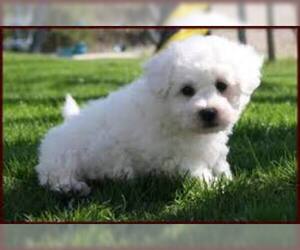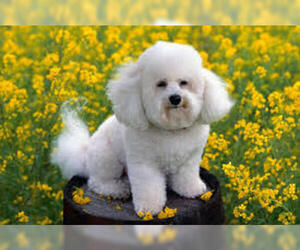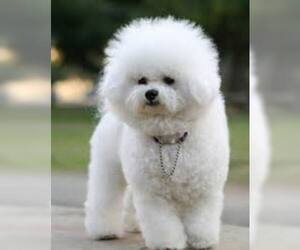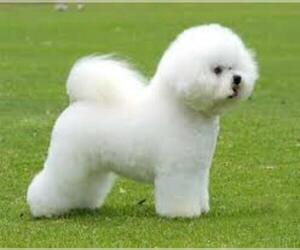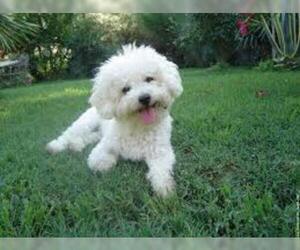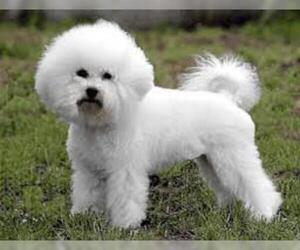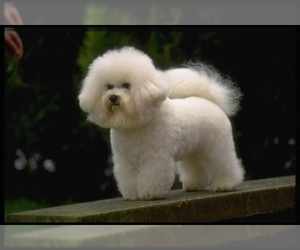
All about Bichon Frise dog breed
A.K.A. :Tenerife dog, Tenerife, Bichon Tenerife, Canary Island Bichon, Bichon a Poil Frise, Bichon à Poil Frisé
Size
Grooming requirements
Exercise requirements
Good with other dogs
Watchdog ability
Energetic
Training requirements
Playful
Affectionate
Good with other pets
Good with children
Good with strangers
Winter
Summer
Healthiness
Protective
Life Span
| Pure Breeds | Member |
| Breeds A - Z | B |
| Breeds by Group | Companion Non-Sporting |
| Breeds by Trait | Good With Kids Hypoallergenic Low Shedding |
| Overview: | The Bichon Frise is a charming and vivacious small dog breed, often described as a "little white puffball." Originating in the Mediterranean, they were historically popular among European nobility. Physically, Bichons are characterized by their soft, curly, double coat of pure white fur, dark, expressive eyes, and a plumed tail carried over their back. Their temperament is generally affectionate, playful, and cheerful, making them excellent companions. They are known for being very sociable and thrive on human interaction, often getting along well with children and other pets, making them a superb choice for families and first-time dog owners. Due to their relatively small size and moderate exercise needs, they are also highly adaptable to apartment living, provided they receive regular walks and playtime. While generally robust, Bichons can be prone to certain health issues, including dental disease, patellar luxation, and allergies, highlighting the importance of responsible breeding and veterinary care. |
F.A.Q.
All You Need to Know About the Bichon Frise Breed
The Bichon Frise is a charming, small dog originating from the Mediterranean, known for its cheerful disposition and distinctive fluffy white coat. These intelligent and playful dogs boast a friendly temperament, making them excellent family pets and companions for singles alike. Their compact size and adaptable nature mean they thrive in apartment living, provided they receive daily walks and playtime. Physically, Bichons have dark, expressive eyes and a plumed tail carried over their back, weighing typically 12-18 pounds. They are considered hypoallergenic due to their non-shedding coat, but require consistent grooming, including daily brushing and professional trims every 4-6 weeks to prevent matting. With moderate exercise needs, a short walk or indoor play suffices. Common health considerations include patellar luxation, dental disease, and allergies. A well-socialized Bichon is a delightful, affectionate, and relatively easy-to-care-for companion.The average weight for a Bichon Frise is typically 12-18 pounds. While there isn't a significant difference, males may sometimes be at the higher end of this range, and females at the lower. This is considered the healthy weight for a Bichon Frise adult, ensuring they are not overweight or underweight. Potential adopters should look for an adult Bichon Frise within this typical weight range for a well-structured, active companion.
Wondering about the Bichon Frise height or how tall is a Bichon Frise? This delightful breed is known for its compact and sturdy build. The average height of a Bichon Frise, measured at the shoulder, typically falls between 9 to 11 inches (23 to 28 cm). This range represents the standard for a healthy, adult Bichon Frise.
While this is the general guideline for their average size, it's worth noting that individual genetics and gender can play a small role. You might find some Bichons slightly outside this range, either a little shorter or a little taller, due to variations in their lineage. However, reputable breeders strive to maintain the breed standard, so most healthy Bichon Frises will fit comfortably within the 9-11 inch height range at the shoulder.The Bichon Frise colors are primarily white. Major kennel clubs like the AKC officially recognize the Bichon Frise as an all-white breed. While some puppies may be born with slight patches of cream, apricot, or buff, these generally fade to white as the dog matures. Any color patches that persist and are larger than a dime are considered a fault in the show ring.Regarding rare coat types and exotic Bichon Frise variations, it's crucial to understand that reputable breeders focusing on the breed standard will only produce white Bichons. Therefore, you won't find naturally occurring or AKC-recognized brindle, fawn, cream (beyond faint puppy patches), blue, lilac, merle, or chocolate Bichon Frises. If a breeder claims to have a Bichon Frise in these colors, it's highly probable that the dog is not a purebred Bichon Frise or is a mixed breed. These "rare" colors are not accepted by major kennel clubs and are not indicative of a healthy or purebred Bichon Frise. Potential adopters should be wary of any claims regarding these uncharacteristic colors, as they often come with inflated prices and may indicate irresponsible breeding practices. Focus on the standard white Bichon Frise colors for an authentic and AKC-compliant pet.
The Bichon Frise personality is generally cheerful, affectionate, and playful. Known for their temperament of Bichon Frise being inherently friendly and outgoing, they form strong bonds of loyalty with their families. These dogs are highly sociable, enjoying the company of people and often adapting well to various social situations. Their adaptable nature makes them excellent for apartment living, thriving in smaller spaces as long as they receive adequate exercise and mental stimulation. They are typically good with children, displaying patience and a playful demeanor, and often get along well with other pets due to their genial disposition. Potential owners can expect a lively, loving companion who enjoys being at the heart of family activities.
The Bichon Frise temperament is known for being exceptionally cheerful and affectionate. They are true companion dogs with a delightful, outgoing personality traits that make them wonderful family members. Bichons are highly sociable and thrive on human interaction, forming strong, loyal bonds with their owners. Their adaptable nature makes them well-suited for apartment living, as long as they receive adequate attention and daily walks. They are generally excellent with children, displaying a gentle and playful demeanor, and typically get along well with other pets due to their friendly disposition.
While intelligent, a Bichon can sometimes exhibit a touch of stubbornness, particularly during training if not approached with positive reinforcement and consistency. They are also quite sensitive to their owners' moods and can become anxious if left alone for extended periods. Their primary desire is to be involved in family activities and bring joy to everyone around them.Bichon Frise care involves regular attention to their unique needs. This low-energy dog breed requires moderate exercise, typically satisfied with daily walks and indoor play. Grooming needs are significant; their non-shedding, double coat demands daily brushing to prevent matting and professional grooming every 4-6 weeks to maintain a healthy coat and prevent skin issues. Frequent bathing (every 2-4 weeks) is also crucial. Dietary considerations include high-quality dog food appropriate for their age and activity level, with portion control to prevent obesity – a common concern. Due to their brachycephalic anatomy, climate sensitivity is vital; avoid extreme heat and humidity to prevent overheating. Regular ear cleaning and inspecting for redness or odor are necessary to prevent infections. Daily dental care, including brushing, is paramount for preventing periodontal disease. Common health tips for Bichon Frise include proactive dental care, monitoring for skin allergies (often manifesting as itching or redness), and managing their weight to avoid joint strain and other health complications. How to care for a Bichon Frise emphasizes consistency in all these areas for a happy, healthy companion.
Bichon Frise Activity Level: How Active Are Bichon Frise?The Bichon Frise activity level is moderate, balancing short bursts of playful energy with significant periods of rest and relaxation. These charming dogs are not high-energy athletes but also not complete couch potatoes. Their exercise needs are manageable, making them suitable for a variety of households, including those with a more relaxed pace.Typically, a Bichon Frise enjoys a few short walks daily, around 20-30 minutes in total, along with indoor playtime. They thrive on interactive games like fetch or chasing toys in the living room. Mental stimulation through puzzle toys or training sessions is also important to keep their bright minds engaged. While they love to play, they are equally content cuddling on the sofa or napping at your feet.Due to their brachycephalic (short-nosed) anatomy, it's crucial to be mindful of their limitations, especially in warm weather or during strenuous exercise. Overexertion can lead to breathing difficulties. Always ensure they have access to fresh water and avoid intense activity during peak heat.How active are Bichon Frise? They are adaptable. While they can keep up with active families for short bursts of fun, they are also wonderfully suited for low-energy households, seniors, or apartment living where their primary exercise comes from walks and indoor play. They excel at being loving companions who enjoy both play and plentiful snuggles.
Breed Breakdown: What Experts Say About the Bichon Frise
I'd rate the "Size" trait of the Bichon Frise a 2. They are undeniably small dogs, typically weighing between 12 and 18 pounds and standing around 9 to 12 inches tall at the shoulder. Their compact, well-proportioned body structure is designed for agility rather than bulk. When compared to other companion dogs, they firmly sit at the smaller end of the spectrum, being significantly daintier than even many other small breeds like Beagles or Corgis, and of course, dwarfed by medium or large breeds. This diminutive size makes them exceptionally well-suited for apartment living, frequent travel, and households with limited space, as they can comfortably navigate small environments and are easily transportable.
I would rate the grooming requirements of the Bichon Frise a 9 out of 10.The Bichon Frise is definitely on the very high-maintenance end of the spectrum when it comes to grooming. Their distinctive double coat, consisting of a soft undercoat and coarser outer coat, is non-shedding, which is a plus for allergy sufferers but a major factor in their high grooming needs. This coat is prone to matting and tangling if not brushed daily, requiring significant time and effort from the owner. Professional grooming every 4-6 weeks is essential to maintain their iconic "powder puff" look, which includes bathing, drying, cutting, and styling. Beyond the coat, their floppy ears need regular cleaning to prevent infections, and their nails grow quickly, necessitating frequent trimming. While they don't have extensive skin folds, their white coat can show tear staining around the eyes, requiring daily cleaning to prevent discoloration and potential irritation. They can also be susceptible to certain skin allergies, which might necessitate specific shampoos or more frequent bathing. Compared to many other companion dogs, the Bichon Frise requires extensive and specialized grooming to keep them healthy and looking their best, making them far from an "easy to care for" breed in this regard.
I would rate the Bichon Frise's exercise requirements at a 3.Bichons are a relatively low-energy breed that thrives on moderate activity rather than demanding routines. Their small size and sturdy build allow them to enjoy daily walks of 20-30 minutes, which are typically sufficient to meet their physical needs. They love playtime, especially interactive games with their owners, and can be quite spirited during short bursts of activity. While they can participate in things like basic agility for fun and mental stimulation, they are not built for intense or sustained physical exertion. Their brachycephalic (short-nosed) anatomy means they can be prone to overheating and respiratory distress in hot weather or during strenuous exercise, so careful monitoring is crucial. They are perfectly content with indoor play and a couple of leisurely strolls around the block, and do not require extensive or highly structured exercise routines to stay healthy and mentally stimulated. In fact, over-exercising can be detrimental.
I'd rate the Bichon Frise's "Watchdog Ability" as a 5. They are incredibly alert and will readily bark at unfamiliar sounds or people approaching the house, making them excellent "early warning systems." Their high-pitched barks are surprisingly effective at signaling a perceived threat to their owners. However, their territorial instincts are more about announcing presence than actively deterring. While they might bark intensely, they are generally not protective in an aggressive or confrontational way, and their small size means they aren't physically intimidating. They are more passive companions who excel at providing meaningful early warnings, rather than being a breed capable of physically deterring an intruder.
I would rate the "Good with Other Dogs" trait of the Bichon Frise a 9 out of 10.Bichon Frises are generally known for their exceptionally sociable and friendly nature, extending readily to other dogs. They typically display a joyful and playful demeanor around unfamiliar canines, often initiating interaction with a wagging tail and an invitation to play. Their smaller size doesn't usually hinder their enthusiasm for interacting with larger dogs, and they can adapt well to various energy levels, often matching the playfulness of another dog or contentedly sharing space with a more sedate companion. While proper socialization is beneficial for any breed, Bichons tend to inherently possess a low potential for aggression or dominance towards other dogs. They genuinely thrive in canine company and often benefit from having a playmate. In multi-dog households, they typically integrate smoothly and contribute to a harmonious environment, provided they receive appropriate individual attention and care. They rarely require careful introductions beyond normal supervised interactions, and their adaptable nature usually allows them to coexist peacefully without extensive training specifically for dog-to-dog interactions.
I would rate the Bichon Frise's "Energetic" trait a 6 out of 10.While not hyperactive like some terriers or working breeds, the Bichon Frise is far from a couch potato. They possess a surprising amount of pep and playfulness, especially in their younger years. Their typical activity level involves bursts of playful energy, enjoying short, spirited games of fetch or chasing toys around the house. They have decent endurance for their size, happily accompanying their owners on moderate walks of 20-30 minutes, and will eagerly participate in daily outdoor excursions. Their need for physical stimulation is moderate; they thrive on regular, engaging play sessions and daily walks to prevent boredom and maintain their cheerful disposition.Compared to other companion dogs, the Bichon is naturally active and alert, always ready for a game or an adventure, but they also appreciate downtime and snuggle sessions. They are not prone to excessive bouncing off the walls, but they do require consistent outlets for their energy.A crucial factor influencing their stamina and exercise tolerance is their brachycephalic (short-nosed) anatomy. While less pronounced than some other brachycephalic breeds, their flattened snouts can make them more susceptible to overheating and respiratory difficulties during intense or prolonged exercise, especially in warm weather. This limits their ability to participate in strenuous or extended athletic activities and necessitates careful monitoring during exercise to prevent overexertion. Therefore, while they have the *will* to be active, their physical limitations due to their anatomy prevent them from being rated higher on the energy scale, as responsible ownership requires moderation in their physical activities.
I'd rate the "Training Requirements" of the Bichon Frise a 3. They are generally intelligent and eager to please, making them quite responsive to commands and positive reinforcement. Their attention span is decent, especially with engaging training methods and plenty of praise and treats. While they can have a playful, sometimes "stubborn" streak if not properly motivated, it's typically more a matter of being easily distracted or having too much fun than genuine defiance. Consistency is key, as with any breed, but they don't require the same level of intense, structured routine as some working breeds. This breed is definitely beginner-friendly, and with a little patience and positive methods, owners will find them a joy to train.
I would rate the Bichon Frise's "Playful" trait a 9 out of 10.Bichons are renowned for their effervescent personalities. They possess a high, yet manageable, activity level, thriving on interactive games and playtime. Their love for games is evident in their enthusiastic responses to toys, often initiating play themselves by nudging or bringing their favorite items. They are natural attention-seekers, not in an overbearing way, but with an endearing desire to be involved and amuse their human companions. Their overall enthusiasm in daily life is infectious, making them naturally spirited and consistently fun-loving compared to many other companion dogs. While they can enjoy a good snuggle, their default mode is typically one of joyful engagement.
I would rate the Affectionate trait of the Bichon Frise breed a 9 out of 10.Bichons are renowned for their incredibly loving and people-oriented nature. They have a strong desire for human companionship and thrive on being close to their families. Physical closeness is a hallmark of the breed; they are enthusiastic cuddlers, dedicated lap-sitters, and will often lean into their owners for affection. Their loyalty is unwavering, and they are highly sensitive to owner emotions, often attempting to comfort or cheer up their loved ones. A common Bichon behavior is to follow family members from room to room, wanting to be part of whatever is happening. They are not independent compared to other companion dogs; in fact, they can be prone to separation anxiety if left alone for extended periods due to their intense need for connection. Bichons truly thrive on affection and being an integral part of their human pack.
I would rate the "Good with Other Pets" trait of the Bichon Frise at a 9.Bichon Frises are generally renowned for their incredibly sociable and adaptable nature, extending to their interactions with other animals. They typically possess a very low prey drive, meaning they are less likely to chase or harm smaller pets like cats or even other dogs. Resource guarding is not a prevalent issue in the breed; they are usually quite happy to share their toys and space. While early socialization is beneficial for any dog, Bichons are often naturally inclined to be friendly and accepting of other pets, making them excellent candidates for multi-pet households. Their playful yet gentle demeanor often means they can coexist peacefully, and even joyfully, with a variety of other animals, often seeking out companionship rather than conflict. While supervision is always wise when introducing any new pet, Bichons typically require minimal specialized training to coexist peacefully, as their inherent temperament is already predisposed to being extremely pet-friendly.
The Bichon Frise rates a solid 9/10 for "Good with Children."This breed is exceptionally child-friendly, naturally possessing a cheerful, gentle, and affectionate temperament that makes them a wonderful companion for families. Bichons are known for their patience and can be quite playful, enjoying interactive games with children. They generally have a good tolerance for noise and handling, making them adaptable to the boisterous energy that often accompanies kids. While early socialization is always beneficial for any dog, the Bichon Frise is naturally inclined to be loving and adaptable, requiring minimal specific training beyond basic obedience to thrive in a family setting. They are naturally gentle and not prone to aggression, making them a safe and joyful presence for children of various ages, from toddlers to older kids who can engage in more active play.
I would rate the "Good with Strangers" trait of the Bichon Frise a solid 9 out of 10. This breed is renowned for its inherently cheerful and outgoing disposition, which extends readily to unfamiliar adults. Bichons are typically very friendly and welcoming, often greeting new people with enthusiastic tail wags and a desire for attention, rather than barking or guarding. While all dogs benefit from early socialization, the Bichon Frise possesses a natural inclination towards sociability that makes them comfortably adaptable in public or guest-filled environments. They genuinely seem to enjoy meeting new people, making them an excellent choice for those who frequently have visitors or take their dog out and about.
I would rate the Bichon Frise's "Winter" tolerance at a 3.Bichon Frises have a thick, double coat that offers some insulation, but their small size, low body fat, and especially their brachycephalic (short-nosed) anatomy significantly limit their cold tolerance. Their small body mass means they lose heat quickly, and the short snout makes them susceptible to respiratory issues in cold, dry air. They are at a higher risk of hypothermia, particularly if exposed for extended periods or if their coat gets wet. While they can enjoy very brief outdoor excursions in cold weather, prolonged activity is not recommended, and they require significantly more special care during winter months compared to most other companion dogs, often needing sweaters or coats even for short walks and close monitoring for signs of discomfort or cold stress.
The Bichon Frise breed rates a 4 for "Summer" tolerance. While not as severely brachycephalic as some breeds, their slightly shortened snout does impact their ability to efficiently pant and cool themselves. They possess a thick double coat, which, despite often being clipped, can still trap heat if not properly managed. This, coupled with their relatively small size, makes them susceptible to overheating. They have a moderate risk of heatstroke and generally require significant caution and supervision during warm weather. Outdoor activity should be limited to early mornings or late evenings on hot days, and never during peak heat. They absolutely need access to air conditioning or a cool, shaded environment with plenty of fresh water during the summer months. Compared to many other companion dogs, Bichon Frises do require special care in summer, including careful monitoring of their activity levels, ensuring constant access to cool environments, and being mindful of their susceptibility to heat-related illness.
I would rate the Bichon Frise's "Healthiness" trait as a 7 out of 10.Bichon Frises are generally a robust and healthy breed, especially when sourced from responsible breeders who screen for common genetic conditions. Their life expectancy, typically 12 to 15 years, is quite good for a small dog. They are not prone to the severe breathing difficulties seen in brachycephalic breeds, nor do they typically suffer from the widespread joint problems of some larger dogs. However, they are predisposed to certain breed-specific issues that prevent a higher rating. Patellar luxation (slipping kneecaps) is a concern, as are various eye conditions like cataracts and progressive retinal atrophy. Dental disease is also very common, requiring diligent at-home care and professional cleanings. Skin allergies can also crop up. While not considered inherently "high-maintenance" in terms of needing constant veterinary intervention, they do require consistent preventive care, particularly for their teeth and eyes, and owners should be aware of the potential for the aforementioned conditions. They are generally more resilient than many highly specialized breeds but not as bulletproof as some truly hardy mixed breeds.
I would rate the "Protective" trait of the Bichon Frise breed a 2 out of 10.While Bichons are certainly alert and will often bark at new sounds or the arrival of strangers, their territorial instincts are minimal, and their primary reaction to unfamiliar individuals is typically curiosity or a desire for attention, rather than a defensive posture. They are immensely loyal to their owners, but this loyalty manifests as an affectionate bond rather than a drive to physically protect. Their small size and gentle temperament make them completely unsuitable as a guard dog, and they are incapable of offering any meaningful physical protection in a household setting. They are quintessential companion dogs, known for their cheerful disposition and their ability to bring joy through their playful nature, not through any protective capabilities.
I would rate the "Life Span" trait of the Bichon Frise a 9 out of 10.The Bichon Frise is considered a long-lived breed compared to many other companion dogs, with an average life expectancy of 12 to 15 years, and often exceeding that with proper care. While they are prone to certain health issues like patellar luxation, dental disease, and bladder stones, these are often manageable or preventable with responsible breeding, consistent veterinary care, and a healthy lifestyle. They don't have a high prevalence of rapidly fatal genetic diseases that significantly shorten their lifespan. Their small size generally contributes to greater longevity than larger breeds, and a loving home with good nutrition and exercise can further extend their healthy years.
Bichon Frise Puppies for saleSee all puppies for sale
Bichon Frise Dogs for adoptionSee all dogs for adoption
Bichon Frise BreedersSee all breeders
Similar Dog Breeds for Bichon Frise
Breed Mixes of Bichon Frise
Quick Breed Selector 0 - not important, 1 - smallest, 10 - largest
Variants & Mistakes :Bichon Fries, Bichon Freeze, Bichon Frize, Bichone Frise, Bichon Frisse, Bichon Frisee, Bicon Frise, Bichon Frees, Bicton Frise, Bishon Frise, Bichon Friess, Bichon Frieze, Bichon Friez, Bichone Frees, Bichon Freez, Bichon Fres, Bichon Friss, Bichon Frisy, Bichone Frize, Bicchon Frise, Bichon Friseh, Bichon Friz, Bichon Friezse, Bichon Fris, Bichon Frissy, Bichon Frissee, Bichone Frezze, Bichon Fress, Bichon Freses, Bichon Friseee, Bichon Friis, Bichon Frisey, Bichon Frisez, Bichon Freise, Bichon Frisses
